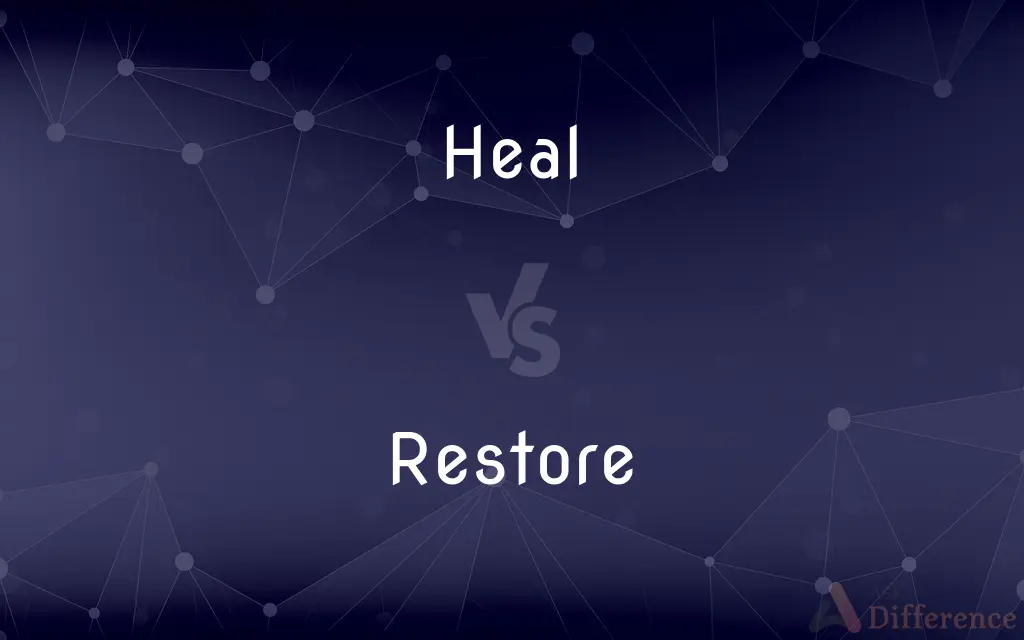Heal vs. Restore — What's the Difference?
By Tayyaba Rehman & Fiza Rafique — Updated on April 30, 2024
Healing refers to the process of recovery from injury or illness, often biological, while restoring involves returning something to its original state, which can include physical objects, ecosystems, or health.

Difference Between Heal and Restore
Table of Contents
ADVERTISEMENT
Key Differences
Healing typically pertains to the biological process in which the body recovers from injuries or diseases. This process involves tissue repair, immune response, and regaining function. Healing can be a natural progression or assisted by medical intervention. On the other hand, restoring generally refers to bringing something back to its original or a usable condition. This could apply to various contexts like restoring an old painting, a damaged ecosystem, or health after medical treatment, indicating a broader application than healing.
For instance, a doctor might focus on healing a patient's wound through medications and treatments that facilitate tissue regeneration and prevent infection. Conversely, restoration in a medical context might involve rehabilitative therapies that help a patient regain full function post-injury or surgery. While both processes aim to improve the condition, healing is more about overcoming the ailment, and restoration is about achieving functionality and previous condition.
In environmental science, healing could refer to the natural recovery of an ecosystem after being disturbed by events like fires or floods. Restoration, however, is more active and may involve human intervention to reintroduce species, remove invasive species, or replant native vegetation to speed up recovery and return the ecosystem to its former state.
When discussing objects, such as artworks or historical artifacts, healing isn't typically used. Restoration is the appropriate term, describing the detailed and careful work needed to return these items to their former glory, often requiring specialized knowledge of materials and techniques.
While healing is predominantly used within the context of biology and health, restoration is used across a wide range of disciplines, emphasizing the return to a prior state more than the recovery process itself. Both terms underscore the transition from a worse to a better state, but their applications and implications can vary significantly.
ADVERTISEMENT
Comparison Chart
Definition
Recovery from injury or illness
Return something to its original condition
Primary Context
Biological health
Various fields (art, environment, health)
Focus
Biological recovery processes
Returning to a former state or functionality
Typical Examples
Healing a bone fracture
Restoring a damaged painting
Associated Actions
Tissue repair, immune response
Repair, replace, rebuild
Compare with Definitions
Heal
Process of recovery from injury or disease.
The healing process after the surgery took several weeks.
Restore
Return something lost or stolen to its proper owner.
The museum restored the artifacts to their country of origin.
Heal
Natural recovery of bodily health.
Adequate rest is essential for good healing.
Restore
Bring back to a previous right or condition.
Efforts to restore the old theater are underway.
Heal
Repair of damaged tissue or organs.
The medication helps in the healing of ulcers.
Restore
Repair or renovate, making it look new again.
They restore classic cars to their original condition.
Heal
Psychological recovery, as from emotional trauma.
Counseling can aid in the healing of psychological wounds.
Restore
Reestablish a previous practice, right, or situation.
The government restored the land to the indigenous tribes.
Heal
Spiritual or emotional betterment.
Meditation contributed to his emotional healing.
Restore
Revitalize or rejuvenate.
The project aims to restore the health of the forest.
Heal
To restore to health or soundness; cure
Healed the sick patient.
Restore
To bring back to an original or normal condition
Restore a building.
Restored the patient to health.
Heal
To ease or relieve (emotional distress)
Only time can heal her grief.
Restore
Bring back or re-establish (a previous right, practice, or situation)
Order was eventually restored by riot police
The government restored confidence in the housing market
Heal
To set right; repair
Healed the rift between us.
Restore
To bring back into existence or use; reestablish
Restore law and order.
Heal
To recover from an illness or injury; return to health.
Restore
To place in a former position or location
Restored the book to the shelf.
Heal
To experience relief from emotional distress
Gave the grieving family time to heal.
Restore
To put (someone) back in a former position or role
Restore the emperor to the throne.
Heal
To be relieved or eliminated
The rift between them finally healed.
Restore
To make restitution of; give back
Restore the stolen funds.
Heal
(transitive) To make better from a disease, wound, etc.; to revive or cure.
This bandage will help to heal your cut.
Restore
(transitive) To reestablish, or bring back into existence.
To restore harmony among those who are at variance
He restored my lost faith in him by doing a good deed.
Heal
(intransitive) To become better or healthy again.
Bandages allow cuts to heal.
Restore
(transitive) To bring back to good condition from a state of decay or ruin.
Heal
To reconcile, as a breach or difference; to make whole; to free from guilt.
To heal dissensions
Restore
(transitive) To give or bring back (that which has been lost or taken); to bring back to the owner; to replace.
Heal
(rare) conceal.
Restore
(transitive) To give in place of, or as restitution for.
Heal
A spell or ability that restores hit points or removes a status ailment.
Restore
To recover (data, etc.) from a backup.
There was a crash last night, and we're still restoring the file system.
Heal
Health
Restore
To bring (a note) back to its original signification.
Heal
To cover, as a roof, with tiles, slate, lead, or the like.
Restore
(obsolete) To make good; to make amends for.
Heal
To make hale, sound, or whole; to cure of a disease, wound, or other derangement; to restore to soundness or health.
Speak the word only, and my servant shall be healed.
Restore
(computing) The act of recovering data or a system from a backup.
We backed up the data successfully, but the restore failed.
Heal
To remove or subdue; to cause to pass away; to cure; - said of a disease or a wound.
I will heal their backsliding.
Restore
To bring back to its former state; to bring back from a state of ruin, decay, disease, or the like; to repair; to renew; to recover.
Our fortune restored after the severest afflictions.
And his hand was restored whole as the other.
Heal
To restore to original purity or integrity.
Thus saith the Lord, I have healed these waters.
Restore
To give or bring back, as that which has been lost., or taken away; to bring back to the owner; to replace.
Now therefore restore the man his wife.
Loss of Eden, till one greater manRestore us, and regain the blissful seat.
The father banished virtue shall restore.
Heal
To reconcile, as a breach or difference; to make whole; to free from guilt; as, to heal dissensions.
Restore
To renew; to reëstablish; as, to restore harmony among those who are variance.
Heal
To grow sound; to return to a sound state; as, the limb heals, or the wound heals; - sometimes with up or over; as, it will heal up, or over.
Those wounds heal ill that men do give themselves.
Restore
To give in place of, or as satisfaction for.
He shall restore five oxen for an ox, and four sheep for a sheep.
Heal
Health.
Restore
To make good; to make amends for.
But if the while I think on thee, dear friend,All losses are restored, and sorrows end.
Heal
Heal or recover;
My broken leg is mending
Restore
To bring back from a state of injury or decay, or from a changed condition; as, to restore a painting, statue, etc.
Heal
Get healthy again;
The wound is healing slowly
Restore
Restoration.
Heal
Provide a cure for, make healthy again;
The treatment cured the boy's acne
The quack pretended to heal patients but never managed to
Restore
Return to its original or usable and functioning condition;
Restore the forest to its original pristine condition
Restore
Return to life; get or give new life or energy;
The week at the spa restored me
Restore
Give or bring back;
Restore the stolen painting to its rightful owner
Restore
Restore by replacing a part or putting together what is torn or broken;
She repaired her TV set
Repair my shoes please
Restore
Bring back into original existence, use, function, or position;
Restore law and order
Reestablish peace in the region
Restore the emperor to the throne
Common Curiosities
How does restoration apply in environmental contexts?
In environmental contexts, restoration involves active efforts to return ecosystems or habitats to their original conditions, often through human intervention.
What are some common methods of restoration in art?
Common methods of art restoration include cleaning, repairing, and sometimes replacing parts of artworks with careful attention to preserving their original integrity.
Can healing occur without medical intervention?
Yes, many forms of healing are natural processes that occur without medical intervention, though intervention can facilitate or speed up the process.
How do restoration efforts impact cultural heritage?
Restoration efforts help preserve and maintain cultural heritage for future generations by keeping historic and cultural artifacts in good condition.
How does psychological healing differ from physical healing?
Psychological healing involves recovering from emotional or mental health issues, which can include therapy and support, whereas physical healing focuses on the body's repair mechanisms.
How does healing differ in acute vs. chronic conditions?
Healing in acute conditions often occurs relatively quickly and responds well to treatment, whereas chronic conditions might involve ongoing management and slower recovery processes.
Is restoration always possible?
Restoration is not always possible, especially if the original state or materials are too deteriorated or lost; in such cases, conservation may be the alternative approach.
What role do restorers play in art preservation?
Restorers play a crucial role in art preservation by applying their expertise to repair and maintain artworks, ensuring their longevity and enjoyment for future generations.
Can emotional healing impact physical health?
Yes, emotional healing can positively impact physical health by reducing stress and improving overall well-being, which can enhance physical recovery processes.
What does healing involve?
Healing involves the body's natural processes of recovering from injury or disease, including tissue repair and immune response.
What is the significance of timely healing in chronic diseases?
Timely healing in chronic diseases is crucial to prevent complications and improve the quality of life.
Can healing be a part of the restoration process?
Yes, in contexts like health, healing can be seen as part of the broader restoration process, aiming to return someone to health.
Why is timely restoration important in disaster-struck areas?
Timely restoration in disaster-struck areas is important to quickly reestablish normalcy and safety for affected communities, preventing further damage and loss.
What challenges face restorers of ancient buildings?
Challenges include matching historical materials, understanding original construction techniques, and dealing with centuries of wear and environmental damage.
What is involved in restoring ecological balance?
Restoring ecological balance may involve reforestation, reintroducing native species, removing invasive species, and managing natural resources sustainably.
Share Your Discovery

Previous Comparison
Accession vs. Ascension
Next Comparison
Bridge vs. HubAuthor Spotlight
Written by
Tayyaba RehmanTayyaba Rehman is a distinguished writer, currently serving as a primary contributor to askdifference.com. As a researcher in semantics and etymology, Tayyaba's passion for the complexity of languages and their distinctions has found a perfect home on the platform. Tayyaba delves into the intricacies of language, distinguishing between commonly confused words and phrases, thereby providing clarity for readers worldwide.
Co-written by
Fiza RafiqueFiza Rafique is a skilled content writer at AskDifference.com, where she meticulously refines and enhances written pieces. Drawing from her vast editorial expertise, Fiza ensures clarity, accuracy, and precision in every article. Passionate about language, she continually seeks to elevate the quality of content for readers worldwide.
















































